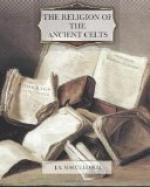This supremacy of goddesses is explained by Professor Rh[^y]s as non-Celtic, as borrowed by the Celts from the aborigines.[327] But it is too deeply impressed on the fabric of Celtic tradition to be other than native, and we have no reason to suppose that the Celts had not passed through a stage in which such a state of things was normal. Their innate conservatism caused them to preserve it more than other races who had long outgrown such a state of things.
FOOTNOTES:
[199] HL 89; Stokes, RC xii. 129. D’Arbois, ii. 125, explains it as “Folk of the god whose mother is called Danu.”
[200] RC xii. 77. The usual Irish word for “god” is dia; other names are Fiadu, Art, Dess.
[201] See Joyce, SII. i. 252, 262; PN i. 183.
[202] LL 245_b_.
[203] LL 11.
[204] LL 127. The mounds were the sepulchres of the euhemerised gods.
[205] Book of Fermoy, fifteenth century.
[206] LL 11_b_.
[207] IT i. 14, 774; Stokes, TL i. 99, 314, 319. Sid is a fairy hill, the hill itself or the dwelling within it. Hence those who dwell in it are Aes or Fir side, “men of the mound,” or side, fairy folk. The primitive form is probably sedos, from sed, “abode” or “seat”; cf. Greek [Greek: edos] “a temple.” Thurneysen suggests a connection with a word equivalent to Lat. sidus, “constellation,” or “dwelling of the gods.”
[208] Joyce, SH i. 252; O’Curry, MS. Mat. 505.
[209] “Vision of Oengus,” RC iii. 344; IT i. 197 f.
[210] Windisch, Ir. Gram. 118; O’Curry, MC ii. 71; see p. 363, infra.
[211] Windisch, Ir. Gram. 118, Sec. 6; IT iii. 407; RC xvi. 139.
[212] Shore, JAI xx. 9.
[213] Rh[^y]s, HL 203 f. Pennocrucium occurs in the Itinerary of Antoninus.
[214] Keating, 434.
[215] Joyce, SH i. 252.
[216] See p. 228. In Scandinavia the dead were called elves, and lived feasting in their barrows or in hills. These became the seat of ancestral cults. The word “elf” also means any divine spirit, later a fairy. “Elf” and side may thus, like the “elf-howe” and the sid or mound, have a parallel history. See Vigfusson-Powell, Corpus Poet. Boreale, i. 413 f.
[217] Tuan MacCairill (LU 166) calls the Tuatha Dea, “dee ocus andee,” and gives the meaning as “poets and husbandmen.” This phrase, with the same meaning, is used in “Coir Anmann” (IT iii. 355), but there we find that it occurred in a pagan formula of blessing—“The blessing of gods and not-gods be on thee.” But the writer goes on to say—“These were their gods, the magicians, and their non-gods, the husbandmen.” This may refer to the position of priest-kings and magicians as gods. Rh[^y]s compares Sanskrit deva and adeva (HL 581). Cf. the phrase in a Welsh poem (Skene, i. 313), “Teulu Oeth et Anoeth,” translated by Rh[^y]s as “Household of Power and Not-Power” (CFL ii. 620), but the meaning is obscure. See Loth, i. 197.




